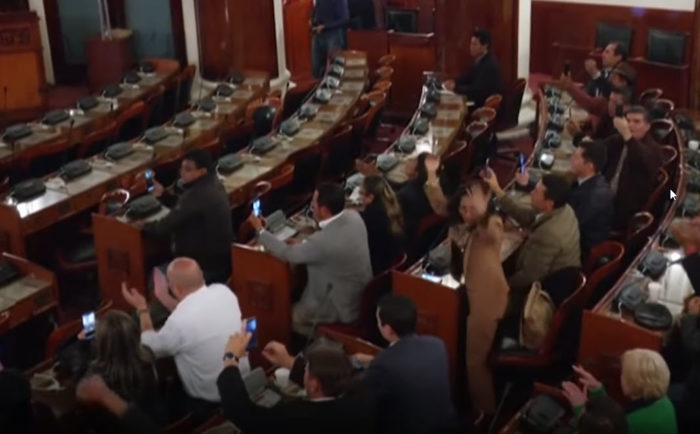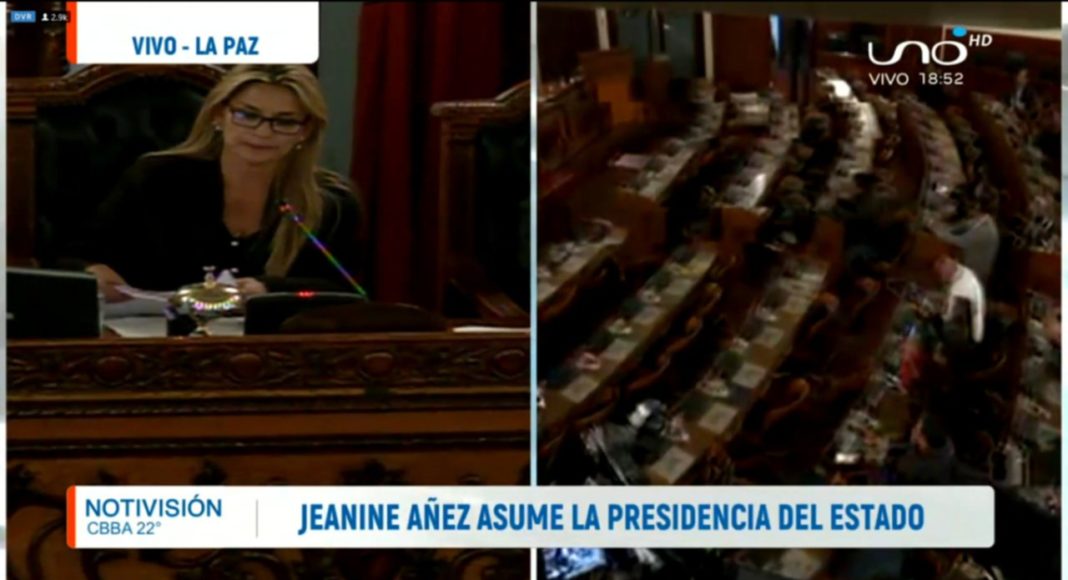The swearing in of Jeanine Añez as interim president of Bolivia is likely to cause further unrest in the country, following three weeks of disturbances that led eventually to the ouster of Evo Morales. Añez, elected as a senator for the right-wing Unidad Nacional alliance in 2014, belongs to the Demócratas grouping of Santa Cruz Governor Rubén Costas. The Comité Pro Santa Cruz, the civic committee in Santa Cruz, emerged as the driving force behind the violent protests spearheaded in Bolivia’s eastern capital and other cities in the weeks since the October 20 election.
Añez was hitherto second vice-president of the Senate. She bases her claim to the presidency on the constitutional principle that in the case of the president and vice-president resigning, the president of the Senate should assume executive control, and failing that the president of the Chamber of Deputies But her claim to be president of the Senate was not ratified by the majority of the upper chamber. Fearing for their safety, senators of the majority Movimiento al Socialismo (MAS) were absent in the session when their opponents designated Añez as president of the Senate and in the joint session of parliament in which Añez appointed herself president.

The resignation of Morales and Vice-president Alvaro García Linera, along with the presidents of both chambers of the legislature, effectively constituted a power vacuum which Añez and her supporters have quickly sought to fill. They are backed by the heads of the police and the armed forces.
However, Morales’s supporters in La Paz and El Alto, as well as leaders of the country’s social movements, are unlikely to take this power grab lying down. There have already been angry protest marches in and around La Paz. Miners from Huanuni and Cloquiri are marching on La Paz. The coca farmers of the Chapare, of which Morales remains titular president, have sworn to restore their leader to office.
Video: El Universal
Añez’s assumption of the presidency has been hailed as a massive victory in Santa Cruz, not least by the president of the Comité Pro Santa Cruz, Luis Fernando Camacho. Camacho, dubbed ‘Bolivia’s Bolsonaro’, is a far-right Catholic businessman who seized the leadership of the opposition movement in the wake of the elections. He side-lined Carlos Mesa, the most-voted opposition candidate who came second to Morales. It was Camacho who whipped up fury among those who doubted the validity of the election results, helping to produce the wave of racist violence that resulted in seven deaths, hundreds of people wounded, and that finally toppled Morales.
Añez has promised fresh elections, but no date has so far been established. A new presidential term is due to start on 22 January, but it is hard to see how this timetable can be met in the present political turbulence, especially should elections involve two rounds of voting. Morales will be certainly barred from standing, possibly along with other MAS leaders.
International responses to the constitutional rupture in Bolivia have varied, with US President Donald Trump, predictably, hailing Morales’s removal as a victory for freedom. Other Latin American leaders have so far been more cautious. Several leaders have referred to the Bolivian ‘coup’. The extent to which Morales’s ouster was part of a premeditated plan is a matter of widespread speculation.
The Organization of American States (OAS) has backed what it sees as a ‘constitutional’ outcome. Its role in the whole affair is questionable, having precipitously released preliminary results from its audit of the elections, a move that eventually prompted Morales’s resignation. OAS Secretary General Luis Almagro, who has emerged as a notable opponent of left-wing governments in Latin America, was among those urging Morales to resign.
The immediate future is likely to be one of bitter contestation between MAS supporters and the new authorities. Morales has already made clear, from Mexico, his intention to return to Bolivia soon ‘with strength and energy’. The MAS as a party may face a dilemma as to whether to legitimise new elections by taking part in them. An alternative candidate to Morales could be difficult to find.
Main image: The Deputy Vice President of the Senate, Jeanine Añez, appeared in a half-empty chamber of the National Assembly (boycotted by members of MAS) and was installed as Interim President of the Republic

John Crabtree is a research associate at the Latin American Centre, Oxford and a senior member of St Antony’s College. He is author (with Ann Chaplin) of Bolivia: Processes of Change, Zed Press (2013) and of LAB titles Patterns of Protest and The Great Tin Crash.

